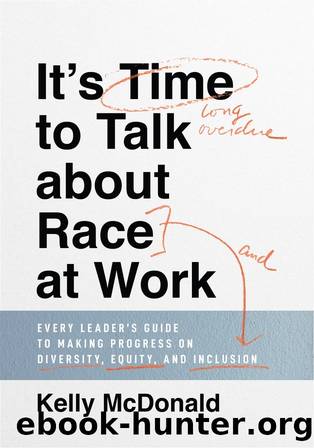It's Time to Talk About Race at Work: Every Leader's Guide to Making Progress on Diversity, Equity, and Inclusion by Kelly McDonald

Author:Kelly McDonald [McDonald, Kelly]
Language: eng
Format: epub
Tags: Business & Economics, Leadership, Management, Workplace Culture, General
ISBN: 9781119790891
Google: MdktEAAAQBAJ
Publisher: John Wiley & Sons
Published: 2021-05-11T00:04:02.227522+00:00
Respect
Respect is powerful. It can move mountains. Respect underscores and amplifies the sincerity and transparency that you bring to the table to make progress on DE&I at work. Before I share ways in which you can demonstrate respect to your coworkers and team, here are four reasons why respect is so effective in bridging differences between people:
Respect acknowledges a person's basic human value. It conveys that we all deserve to be treated with kindness, fairness, and dignity. From a workplace standpoint, respect honors a person's experiences, perspective, talent, and accomplishments.
Respect communicates acceptance. When we accept someone for who they are, even if they are different from us or we don't agree with them, it fosters trust. Coworkers and teams must be able to trust each other to be effective at work.
Respect creates an environment in which people feel safe to express themselves. This is critically important for any business, because innovation and breakthroughs for better business approaches come when team members feel safe enough to explore new ways of thinking or working and safe enough to try new things.
When we feel respected, we feel seen and valued. When I was about eight years old, I got a modest allowance that I was allowed to spend any way that I wanted. My friend and I would go to the neighborhood drugstore and buy gum or candy or comic books. When we would go to the cashier to pay, many times an adult customer would approach and start putting their items on the counter, even though we were there first. We learned to step aside and let the adult go first, not out of respect, but because they were bigger and they âmattered,â and we were kids and âdidn't matter.â This feeling of ânot matteringâ was reinforced by the actions of the cashier, who would just start ringing up the adult customer's items. But one day, as I was putting my gum on the counter to pay, an adult woman hustled up next to me and began unloading her basket of items on the counter. She pushed my gum to the side to move her items forward and started reaching for her wallet to pay. The owner of the drugstore was working as the cashier that day and he looked at me, looked at her, and then said, âMa'am, this girl was here first. Let me take care of her and then I will help you.â The woman was angry! She muttered and harrumphed and glared at me. She assumed her âadult-nessâ overrode my âkid-ness.â And I had always assumed the same thing! The store owner took his sweet time in ringing me up, chatting with me for a moment, and carefully putting my gum in a paper bag for me. This story sounds so silly and inconsequential, but I vividly recall the way it made me feelâlike I mattered. It made me feel that, although I was a little kid with my little purchase of gum, I was seen and I was valued.
Download
This site does not store any files on its server. We only index and link to content provided by other sites. Please contact the content providers to delete copyright contents if any and email us, we'll remove relevant links or contents immediately.
Zero to IPO: Over $1 Trillion of Actionable Advice from the World's Most Successful Entrepreneurs by Frederic Kerrest(4521)
Machine Learning at Scale with H2O by Gregory Keys | David Whiting(4293)
Never by Ken Follett(3937)
Harry Potter and the Goblet Of Fire by J.K. Rowling(3848)
Ogilvy on Advertising by David Ogilvy(3604)
Shadow of Night by Deborah Harkness(3360)
The Man Who Died Twice by Richard Osman(3072)
Book of Life by Deborah Harkness(2931)
The Tipping Point by Malcolm Gladwell(2914)
Will by Will Smith(2910)
0041152001443424520 .pdf by Unknown(2843)
Purple Hibiscus by Chimamanda Ngozi Adichie(2826)
My Brilliant Friend by Elena Ferrante(2824)
How Proust Can Change Your Life by Alain De Botton(2807)
How to Pay Zero Taxes, 2018 by Jeff A. Schnepper(2646)
Hooked: A Dark, Contemporary Romance (Never After Series) by Emily McIntire(2550)
Rationality by Steven Pinker(2352)
Can't Hurt Me: Master Your Mind and Defy the Odds - Clean Edition by David Goggins(2323)
Borders by unknow(2303)
